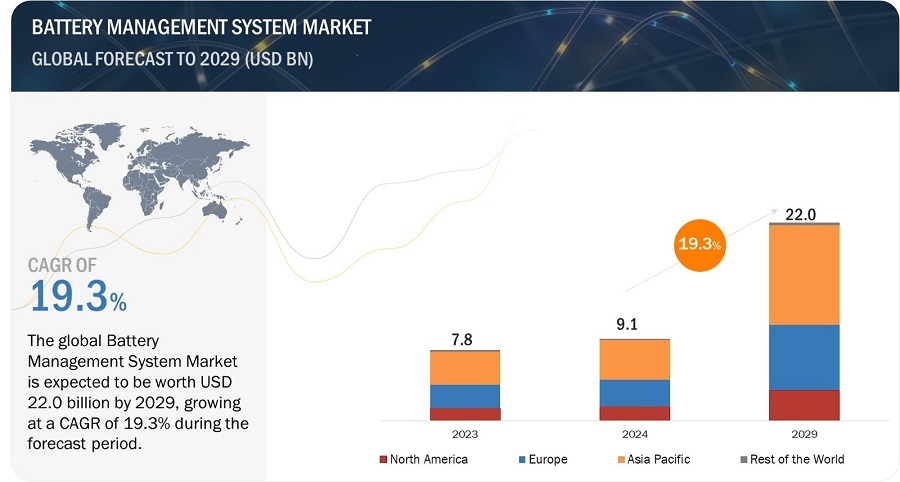The global Battery Management System (BMS) Market is set for significant expansion, with projections indicating a rise from USD 9.1 billion in 2024 to USD 22.0 billion by 2029, achieving a CAGR of 19.3%. This growth is driven by the increasing demand for efficient energy storage and management solutions across various industries. A BMS is essential for monitoring and managing the performance of rechargeable batteries, ensuring safety, efficiency, and longevity. As the adoption of lithium-ion, lead-acid, nickel-based, solid-state, and flow batteries continues to grow, the role of BMS in optimizing battery usage and protecting against overcharging, overheating, and other potential hazards becomes increasingly vital. The market’s expansion is also fueled by advancements in battery technology and the growing application of BMS in sectors such as electric vehicles, renewable energy storage, and industrial automation, making it a critical component in the future of energy management.
Download PDF Brochure @ https://www.marketsandmarkets.com/pdfdownloadNew.asp?id=234498189

Key functionalities of a battery management system (BMS) encompass the management of power output, delivering real-time updates on battery charging and discharging status, enforcing critical safety measures to protect batteries from potential damage, and optimizing battery lifespan and efficiency. These systems are predominantly integrated with high-energy battery variants such as lithium-ion, advanced lead-acid, flow, and nickel-based batteries. Among these, lithium-ion batteries are the most widely utilized in conjunction with BMS across various industries. Their widespread adoption is attributed to their high energy density, long cycle life, and reliability, making them ideal for applications in electric vehicles, renewable energy storage, and portable electronics. The integration of BMS with lithium-ion batteries ensures optimal performance, safety, and extended operational life, driving their popularity across diverse sectors.
The Lithium-ion battery segment to hold largest market share during the forecast period.
Lithium-ion batteries are recognized as top-performing rechargeable battery technology, excelling in key metrics such as usable capacity, charging speed, and lifespan. By harnessing lithium, a material known for its lightweight properties and outstanding electrochemical potential, these batteries achieve the highest energy density per unit volume and weight. However, lithium-ion’s inherent instability necessitates meticulous management during charging and discharging to ensure safety and performance. Adherence to specific precautions is crucial for unlocking the full benefits of lithium-ion batteries, making them superior to other battery chemistries. In this context, battery management systems (BMS) play a vital role, driving the widespread adoption and growth of lithium-ion batteries across various industries. The BMS ensures the safe, efficient, and long-lasting operation of lithium-ion batteries, solidifying their dominance in applications ranging from electric vehicles to portable electronics and renewable energy storage.
Inquire Before Buying @ https://www.marketsandmarkets.com/Enquiry_Before_BuyingNew.asp?id=234498189
Distributed topology segment projected to grow at a significant growth rate during the forecast period.
In a distributed battery management system (BMS) configuration, each cell in the battery pack is equipped with its own dedicated slave board, tasked with monitoring and managing individual cell performance. These slave boards are interconnected through a single communication cable that links the battery to a central controller. Each cell is connected to voltage signals, a temperature sensor, and both internal and external communication cables. Distributed topologies offer simpler installation and enhanced reliability compared to centralized BMS setups. However, challenges such as the need for multiple mini circuit boards and difficulties in mounting these boards on certain cell types can arise. Additionally, in battery packs with a large number of cells, the cost of implementing a distributed system may surpass that of a centralized approach, making the decision between the two configurations dependent on specific application needs and cost considerations.
The industrial segment is expected to grow at a significant CAGR during the forecast period.
In both commercial and industrial sectors, the demand for uninterrupted, high-quality power supply and effective contingency plans is steadily increasing. Automated guided vehicles (AGVs), commonly used in industrial environments, are robotic platforms designed to transport materials within manufacturing facilities or warehouses. These AGVs navigate using various methods, such as floor-installed wires, markers, or advanced vision and laser systems, making them invaluable in enhancing material handling efficiency in the manufacturing industry. AGVs primarily utilize advanced lead-acid batteries due to their reliability and cost-effectiveness compared to other battery chemistries. However, to ensure optimal performance and extend the lifespan of these batteries, it is crucial to protect them from over-discharge and insufficient charging. This is where the implementation of a robust battery management system (BMS) becomes essential, as it enhances battery operations and ensures prolonged shelf life, ultimately contributing to the overall efficiency and reliability of AGVs in industrial settings.
Browse For More Details – https://www.marketsandmarkets.com/Market-Reports/battery-management-bms-market-234498189.html
North America to hold a significant market share 2029.
The North American Battery Management System Industry is witnessing significant growth, driven primarily by the automotive sector and the increasing demand from the renewable energy industry. Major automotive players like General Motors (US) and Ford Motor Company (US) are key contributors to the rising need for battery management systems in this region. Additionally, the adoption of lithium-ion batteries for renewable energy storage, particularly in wind and solar energy applications, is on the rise across the US. Automotive, renewable energy storage systems, and telecommunications are emerging as the sectors with the highest growth potential within North America’s Battery Management System Market.
The major players include Sensate Technologies, Inc. (Japan), Eberspächer (Germany), Panasonic Holdings Corporation (Japan), and LG Energy Solution. (South Korea), AVL (Austria), FICOSA International SA (Spain), Leclanché SA (Switzerland), Elithion (US), BMS PowerSafe (France), PowerTech Systems (France).
News Covered:
